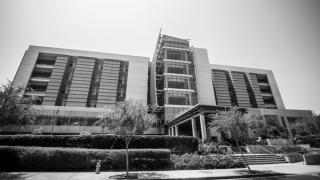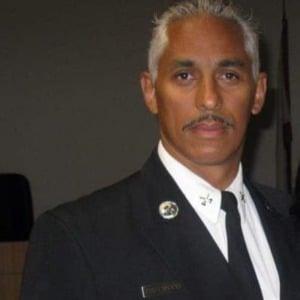Matthew Gatewood was in the prime of his life at 39 — a workout devotee and weekend athlete — when concerning results from a physical exam culminated in the shock of a multiple myeloma diagnosis. Worse still, an oncologist offered the grim prognosis that he might live five more years with treatment, two without.
That was 2006. Gatewood, a resident of Santa Clarita and captain with the Los Angeles Fire Department, still abides today, thanks to help from City of Hope and international multiple myeloma expert Amrita Krishnan, M.D., professor of hematology & hematopoietic cell transplantation and director of the Judy and Bernard Briskin Center for Multiple Myeloma Research. Her initial message to him was simple: “I’ve looked all over your report, and I don’t see a date of death anywhere.” At City of Hope, he has received two blood stem cell transplants, taken part in several clinical trials and continues with maintenance therapy.
Gatewood, 55, shares his story as he looks forward to bearing the standard of hope for patients like him as a part of City of Hope’s delegation at the 2023 Rose Parade.
What were your main concerns when you were first diagnosed?
Many things flashed through my mind, mostly thoughts of my children. My son was 15 at the time and my daughter was 8. How do I tell them? How do I see them through into adulthood? And what about my own life? I didn’t envision having to make end-of-life decisions at 39.
How did you feel when Dr. Krishnan said that your prognosis wasn’t set in stone?
I felt extreme relief. I thought, “OK, here are people who know what they’re doing and have confidence in their work.” And that was exactly what I needed.
Your partnership with Dr. Krishnan has lasted more than 15 years now. What does it mean to you?
Being Dr. Krishnan’s patient probably makes me a little arrogant, because I know I’ve got the best doctor. She’s has a wealth of knowledge — not just academic, but knowing how to apply what they’ve learned — and she’s always at the cusp of a new opportunity for a big break in this fight.
What motivates you to participate in clinical trials?
I was always willing to try something that might give me what I wanted — to stay active, continue to work, fight this thing on my feet — as well as give someone else an opportunity to be healthy. I could be the first one to be healed. But if that didn’t work, I could help doctors understand what this medicine would do for someone else.
Dr. Krishnan always talks about her and her team working for a cure, and with my help, they could do that. She made me part of the team, and she made it important for me to fight because now it wasn’t just about me. I know that I have an impact on other patients.
How would you characterize your time at City of Hope overall?
When I go to campus, I’m not just being treated by Dr. Krishnan. I’m being treated by every doctor who walks past me, the nurses, the people at the blood lab, the maintenance people, the tram driver, the poor guy at Starbucks who gets me my coffee when I’m looking grumpy.
Everyone there seems to have this innate ability to encourage you to feel good. It’s the smiles, remembering my name, asking me how I’m doing without making it sound like it’s a terrible day for me.
They say that at amusement parks, you don’t go there for the ride. You go there for the experience. When I walk into City of Hope, it’s not just treatment; it’s an experience.
Who or what inspires you when things get difficult?
My son, who was born blind. I’ve had challenges with this disease, but he’s dealt with challenges his entire life. When I think things are tough for me, I think of him.
You were told you had a short time to live, and here we are 15-plus years later. Is there something in your life that’s happened since that makes you feel especially fulfilled?
I was given the opportunity to meet my wife, Patrice. I have truly been blessed with the most amazing wife. When I explained my condition to her, she looked at me and said, “Well, then I guess we’re in a fight. And we’re going to be OK.” She never blinked.
How has your experience changed your perspective on life?
We could probably run down the gamut of changes. This experience has not only given me better health, but made me a better person. I care about things that I didn’t care about before. I have more compassion.
I’m not in a hurry anymore. I try to enjoy the moment. I have a cell phone like everyone else, but I don’t take pictures. Wherever I am, I want to see it, and experience it, and feel it like it’s my last time being there. Since I was given this opportunity, I don’t want to waste it.

